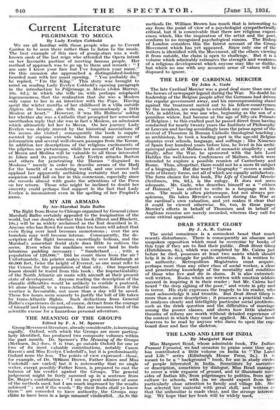THE MEANING OF THE GROUPS Edited by F. A. M.
Spencer
Group Movement literature, already considerable, is increasing rapidly. Oxford, with which the Groups are more particu- larly identified, has produced two composite volumes within the past month. Dr. Spencer's The Meaning of the Groups (Methuen, 5s.) does, it is true, go outside Oxford for one or two of its most valuable contributions, notably Canon Raven's and Miss Evelyn Underhill's, but it is predominantly Oxford none the less. The points of view expressed—those, for example, of Dr. William Brown, Father Knox and Miss Underhill—are varied: but it is noteworthy that no single writer, except possibly-Father Knox, is prepared to cast the balance of his verdict against the Groups. The general judgement might be fairly summed up in a sentence from Dr. Major's contribution : " I am no great admirer of some of the methods used, but I am much impressed by the results achieved " ; and if the words " By their fruits shall ye know them " are conceded to have authority, ;the Groups may claim to have been in a large measure, vintlicaVed. As to the
methods Dr. William Brown has much that is interesting to say from the point of view of a psychologist sympathetically critical, but it is conceivablethat there are religious experi- ences which, like the ins iration of the artist and the poet, conform to no recognized psychological canons. The Bishop of London considers this the fairest account of the Group
Movement which has yet 'appeared. Since Only one of the writers is identified with the Movement, 'all the others viewing it from outside, the claim is open to challenge:: But it is a volume which admirably estimates the strength and weakness of a religious development which anyone may like or dislike, but which no one with any accurate sense of values will be disposed to ignore.
















































 Previous page
Previous page